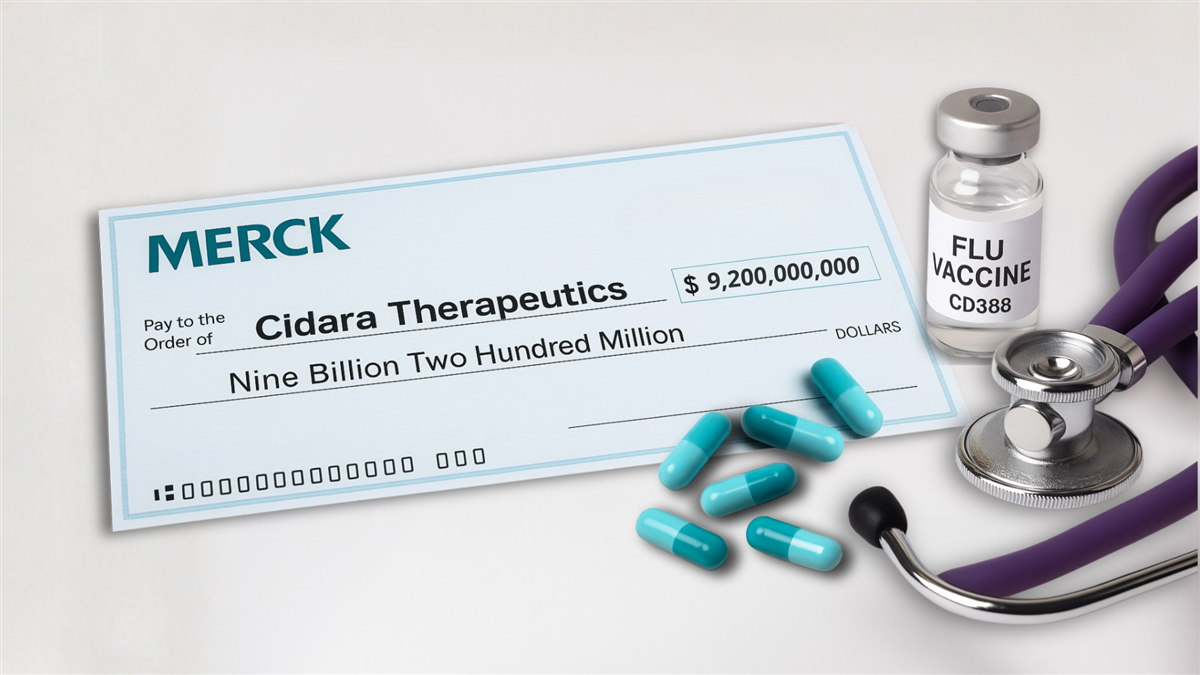Good day,
Thank you for subscribing to the Earnings360 newsletter, your daily source for quarterly earnings news and updates.
Each morning edition contains a wrap-up of today's pre-market earnings announcements and yesterday's earnings announcements after the closing bell.
Before we send you your first edition, please take a moment to confirm your subscription below. We will not be able to send your newsletter until you confirm your subscription.
Confirm Your Subscription Here
The Earnings360 Team
Thursday's Featured Content Merck Writes a $9.2 Billion Check for a Flu Drug That Could Change EverythingWritten by Jeffrey Neal Johnson. Published 11/18/2025. 
Key Points - Merck's major acquisition of Cidara Therapeutics demonstrates a clear and proactive strategy to build its next-generation long-term revenue drivers.
- The acquisition secures a high-potential, late-stage antiviral drug that has already earned key designations from the FDA for its innovative approach.
- This strategic move reinforces Merck’s strong financial fundamentals and its unwavering commitment to creating sustainable, long-term value for its shareholders.
In one of the most decisive strategic moves in the biotech sector this year, pharmaceutical titan Merck & Co. (NYSE: MRK) has committed $9.2 billion in cash to acquire Cidara Therapeutics (NASDAQ: CDTX). The announcement immediately sent Cidara’s stock price soaring by more than 100%, a clear win for its investors. Just like Microsoft and Adobe rode the software wave in Web 1.0, RAD Intel is riding the AI software wave in 2025. Their product helps brands instantly find the right audience and message using AI – solving the #1 waste in marketing: misfired ad spend.
Already trusted by a who's-who of Fortune 1000 brands and leading global agencies – with recurring seven-figure partnerships in place. With a Nasdaq ticker reserved, $RADI, it's early – but very real. $0.81 won't last – price changing TONIGHT... For Merck, the market's measured reaction reflects confidence in a carefully planned strategic move. This acquisition is more than a headline; it demonstrates Merck’s forward-looking strategy to build the next generation of revenue drivers from a position of financial and operational strength. A Strategic Imperative: Securing the Next Decade For any pharmaceutical leader, managing the lifecycle of blockbuster drugs is the ultimate strategic test. Merck is proactively preparing for the 2028 patent expiration of Keytruda, its flagship cancer therapy that has reshaped oncology and currently generates a significant portion of revenue. Rather than waiting for that challenge, the company is executing a science-led business development strategy to diversify its portfolio for the next decade. This is a deliberate, offensive move—not a reaction. The Cidara acquisition exemplifies that approach and is supported by Merck’s robust financial position. With trailing-twelve-month net income of over $17 billion and a debt-to-equity ratio (D/E) of 0.69, Merck can absorb a $9.2 billion deal without straining operations or shareholder commitments. This follows last month's completed acquisition of Verona Pharma and its promising COPD drug, OHTUVAYRE. These transactions illustrate management’s discipline in using Merck’s balance sheet to buy external innovation and systematically mitigate future risks. By expanding into the respiratory antiviral space, Merck gains exposure to recurring revenue opportunities in the large global influenza market—an intelligent diversification from highly competitive oncology. CD388: What Makes a Flu Drug Worth Billions? At the center of the nine-billion-dollar valuation is Cidara's lead investigational drug, CD388. CD388 is more than an incremental flu treatment; it could represent a paradigm shift in influenza prevention, which helps justify the premium price. Its value rests on several attributes that reduce risk and increase commercial potential. - Advanced and de‑risked: CD388 is already in Phase 3 clinical trials, the final and most costly stage before regulatory submission. That advanced position means much of the early scientific and clinical risk has been addressed—an important consideration for an acquirer like Merck.
- A potential new standard of care: As a long‑acting antiviral, CD388 is designed to provide season‑long protection against both influenza A and B from a single dose. That one‑and‑done approach would be a meaningful advantage over current annual vaccines, which must be reformulated each year. Its strain‑agnostic design aims to be effective regardless of the dominant circulating variants.
- Regulatory confidence: CD388 has received both Breakthrough Therapy and Fast Track designations from the U.S. Food and Drug Administration (FDA). Those designations are granted to therapies targeting serious conditions that may offer substantial improvement over available options, potentially speeding the path to market.
Merck’s management projects a commercial opportunity that could exceed $5 billion annually, a blockbuster potential that helps explain the acquisition price and its prospective impact on Merck's top line. What This Deal Means for Investors For investors, Merck’s acquisition of Cidara materially strengthens the long‑term bullish case for the stock. The deal creates a tangible growth pathway that helps insulate the company from future patent cliffs—a major risk for pharmaceutical valuations. It shows management is not only aware of long‑range challenges but is executing a decisive, well‑capitalized plan to address them. That strategic foresight is backed by attractive financial fundamentals. Merck’s stock trades at a forward price‑to‑earnings ratio (P/E) of roughly 10.4, a valuation that looks reasonable given its growth prospects and the broader market. The company’s commitment to shareholder returns is clear, with a dividend yield of 3.48% that has been increased for 14 consecutive years. That dividend is supported by a payout ratio of about 42.8% of earnings, leaving ample capital for reinvestment and strategic deals like this one. With a consensus analyst price target of around $104.50, the stock offers near‑term upside of roughly 12%. The shares have already gained more than 10% in the last month, and this acquisition provides a fundamental catalyst to sustain positive momentum. The Cidara deal is more than a pipeline add-on; it signals proactive leadership and long‑term value creation, reinforcing Merck’s standing as a blue‑chip innovator preparing thoughtfully for the future.
|